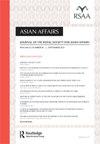“CHINESE” STUDIES FOR THE 21st CENTURY
IF 1.1
Q2 AREA STUDIES
引用次数: 0
Abstract
The 20 century saw major shifts in the way China and “things Chinese” were studied in Western universities. Old-fashioned Sinology continued to be dominant, but the Cold War era witnessed the rise of “area studies” which, in the China field, meant the social sciences took centre stage. In the literary and cultural field, however, change was slow to arrive; China’s 20 century literature and culture was still considered a poor relative next to the Sinological canon. In this commentary, having told my story about the landscape of Chinese studies of which I was part, I shall look at the shape that academic studies related to China, Chinese, and Chineseness might take from now on. How should academics account for and represent the UK’s historical vision of, and relationship with, “China” and “Chinese” people? How should the vast diversity that is China and the rest of the Chinese-speaking world be broached without risking the creation of new, fixed “objects” of study?21世纪的“中国”研究
20世纪,西方大学研究中国和“中国事物”的方式发生了重大变化。老式的汉学仍然占主导地位,但冷战时期见证了“区域研究”的兴起,在中国领域,这意味着社会科学占据了中心地位。然而,在文学和文化领域,变革进展缓慢;中国20世纪的文学和文化仍然被认为是仅次于汉学经典的穷亲戚。在这篇评论中,我讲述了我所参与的中国研究的前景,我将看看从现在起,与中国、中国和中国性相关的学术研究可能会呈现出什么样的形态。学术界应该如何解释和代表英国对“中国”和“中国”人民的历史愿景以及与他们的关系?在不冒创造新的、固定的“研究对象”的风险的情况下,中国和其他华语世界的巨大多样性应该如何处理?
本文章由计算机程序翻译,如有差异,请以英文原文为准。
求助全文
约1分钟内获得全文
求助全文

 求助内容:
求助内容: 应助结果提醒方式:
应助结果提醒方式:


